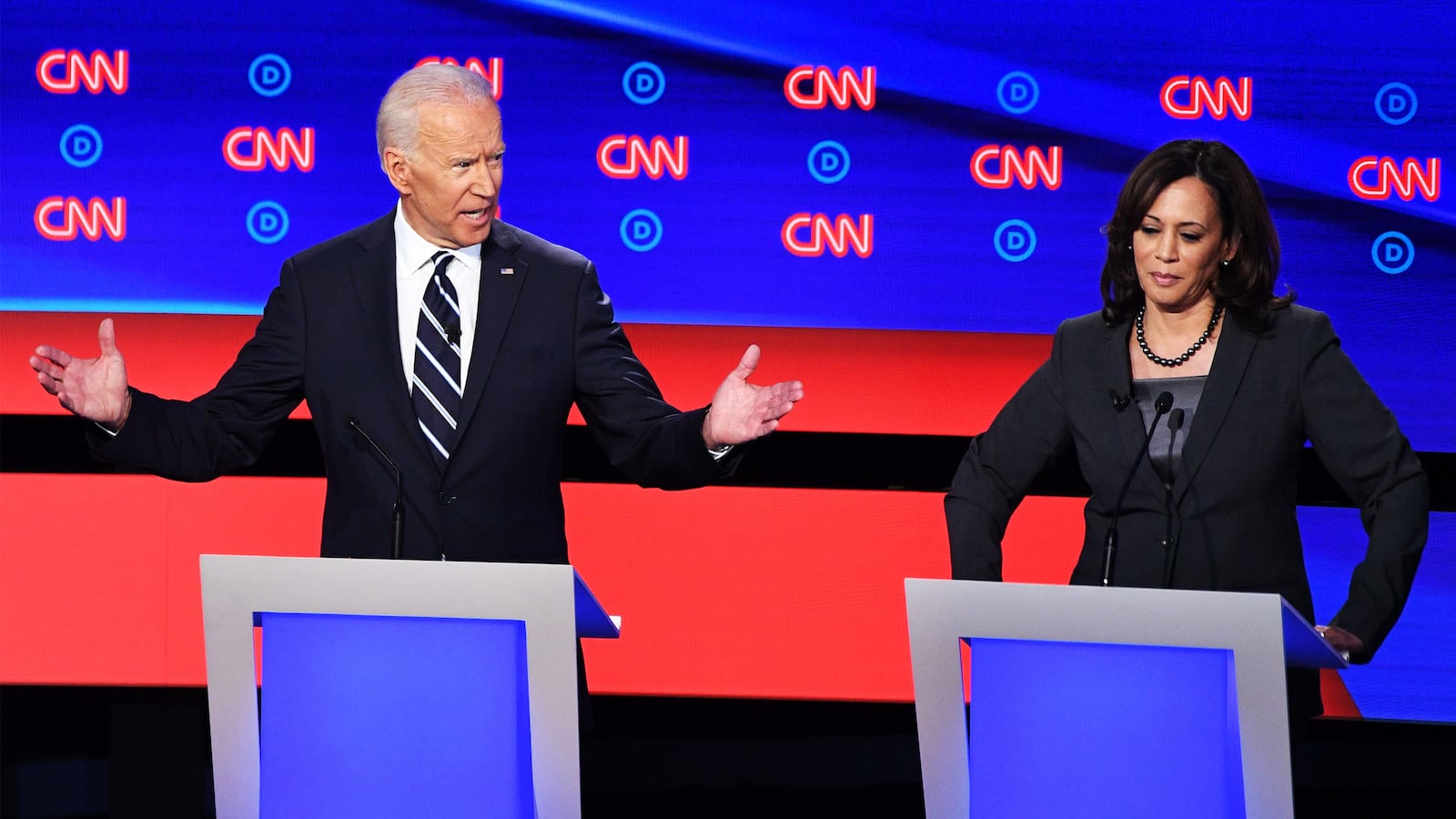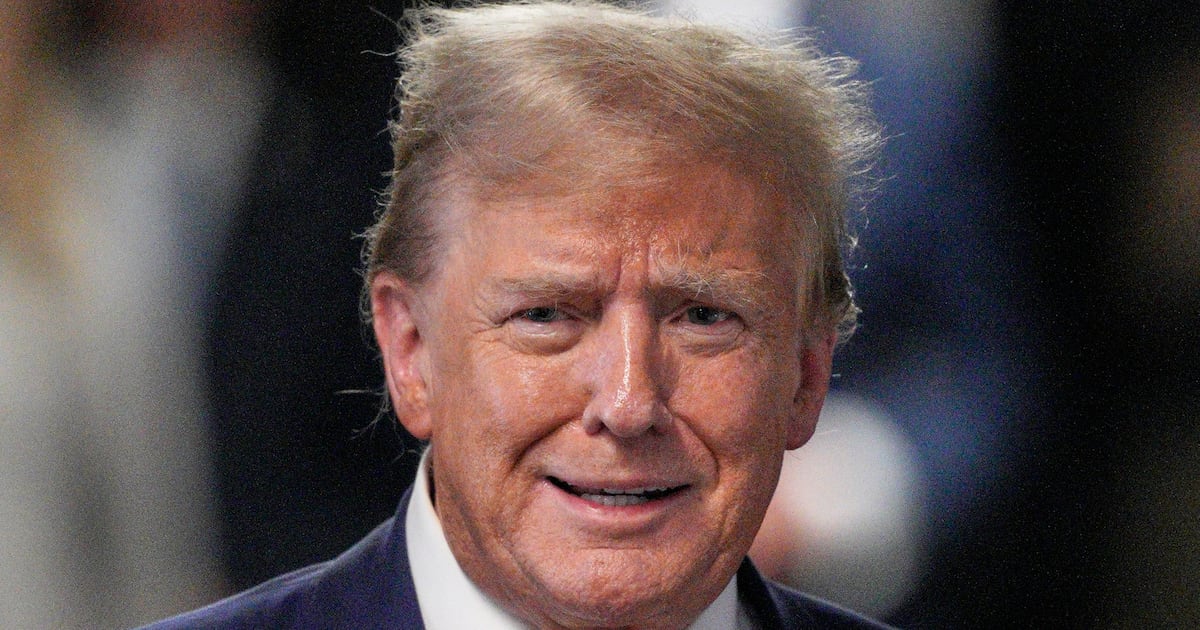DETROIT—“Go easy on me, kid,” former Vice President Joe Biden told Sen. Kamala Harris as they met onstage on Wednesday evening.
She didn’t. And neither did he.
In a pointed back-and-forth at the outset of the second part of the second Democratic presidential debate, Biden and Harris squared off about the California senator’s proposed phase-in of a “Medicare for all” health care plan, which the former vice president dismissed as “double talk.”
“Any time someone tells you you're going to get something good in ten years, you should wonder why it takes ten years,” Biden said of Harris’ plan, which involves a decade-long phase-in of ending private insurance in favor of universal government-provided health care coverage. “This is the single most important issue facing the public—to be very blunt and to be very straightforward, you can't beat President Trump with double talk on this plan.”
Harris called Biden’s characterization of her plan “simply inaccurate,” and pointed out that her plan was crafted by the architect of Obamacare.
“The cost of doing nothing is far too expensive,” Harris said. “We are now paying $3 trillion a year for health care in America—over the next ten years it will probably be $6 trillion. We must act.”
Biden retorted that Harris’ plan requires increases in taxes on the middle class, and that stripping people of private insurance is a step too far.
“No one has to keep their private insurance, but if they like their insurance, they should be able to keep it,” Biden said.
Harris’ phase-in plan has received mixed reviews both from opponents who want to preserve private insurance, and supporters who worry than a ten-year lead time would allow a potential Republican successor to dismantle the system before it came into being. Harris defended the ten-year window, saying that it was reflective of the views of Americans she had spoken to on the campaign trail.
At the end of the day, Harris said, “employers are not going to be able to dictate the kind of health care that their employees get.”
After Tuesday’s debate, which revolved largely around major policy differences between progressives frontrunners Sens. Bernie Sanders and Elizabeth Warren and the more moderate Democrats who flanked them, the exchange—set up by moderator Dana Bash—was the first indication that Wednesday’s event would feature sharper elbows—and more direct attacks between candidates seeking the party’s nomination.
After the randomized lineup for the second half of the second primary debate was announced two weeks ago, the promised “rematch” between Biden and Harris appeared likely to loom over the debate. The former vice president suffered a drop in national polls after Harris condemned his past work with white supremacists in the Senate in deeply personal terms.
“There was a little girl in California who was part of the second class to integrate her public schools, and she was bussed to school every day,” Harris said, in reference to Biden’s former opposition to federally mandated school busing to integrate schools. “That little girl was me.”
The line was a defining moment of the debate, and for the Harris campaign, which even made a T-shirt out of it.
Although the California senator’s own stance on the issue has proven to be closer to Biden’s than she let on, the criticism appeared to knock the current frontrunner back on his heels. Biden, who has been in elected office for longer than some of his Democratic rivals have been alive, has since been forced to contend with criticism of some components of his résumé, and has seen his considerable edge with black voters potentially threatened.
Some of the critiques have targeted Biden’s support for the policies of President Barack Obama, in whose administration Biden served, or Biden’s time in the Senate. Harris has hit Biden for Obama-era deportation policies for undocumented immigrants; Gov. Jay Inslee of Washington has railed against Biden’s insistence that he can have a productive relationship with Senate Republicans. Sen. Cory Booker lashed out after Biden waxed nostalgic about working alongside white supremacist and segregationist colleagues in the Senate, as well as his steering of the 1994 crime bill that helped create the modern carceral state.
Even President Donald Trump—who has spent weeks embroiled in self-ignited controversies over his own racist comments—has jumped on the bandwagon, accusing Biden of being too tough on crime to win over black voters.
The Biden campaign indicated before the debate that the former vice president would not be caught flat-footed again, particularly on mass incarceration.
“The absurdity of this attack is obvious,” deputy campaign manager Kate Bedingfield said in a statement earlier this week, referring to Booker’s criticism of the crime bill and noting that Booker once promised a zero-tolerance policy for minor infractions, “exactly the kind of policy that enmeshed many undeserving people in a criminal justice system.”
Biden may not be the only candidate facing aggressive criticism on Wednesday. Rep. Tulsi Gabbard of Hawaii signalled last week that Harris herself needs to answer for her attacks on Biden, which Gabbard implied were uncivil.
“Joe Biden did not ‘celebrate’ or ‘coddle’ segregationists. His critics have unfairly misrepresented his important message to score cheap political points,” Gabbard tweeted last week, tagging Harris’ official campaign account. “In order for Congress to work for the American people, we need to find common ground with each other. That is not possible without civility.”






